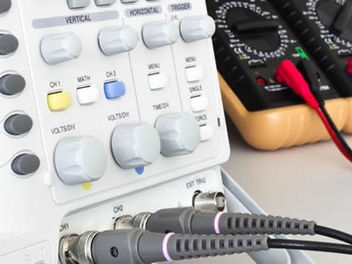Understanding Electrical Testing: Protecting Your Business and Employees
- Guy hudson
- Jan 10, 2025
- 8 min read
Electrical safety is a critical concern for any business. Neglecting to conduct regular electrical testing can expose your workplace to numerous hazards, including electrical shocks, fire risks, and equipment failure. In addition to the immediate safety threats, failing to implement routine electrical checks can have long-term consequences on your business operations, employee well-being, and property protection. Regular electrical testing plays a vital role in preventing these dangers, ensuring safe work environments, and providing peace of mind.
This blog post will explore the significance of electrical testing, its role in compliance with safety regulations, and how it can protect your employees and business from electrical hazards. We will also discuss the importance of testing key elements such as electrical installations, electrical equipment, and portable appliances.
The Importance of Electrical Testing in Preventing Electrical Hazards
Electrical hazards are not always immediately visible. Faulty wiring, deteriorating equipment, and outdated installations can be ticking time bombs in the workplace. Regular electrical testing helps prevent accidents and ensures that everything from the electrical installation to portable appliances is safe for use.
Key Benefits of Electrical Testing:
Reducing the Risk of Fires: Electrical faults are one of the leading causes of workplace fires. A short circuit, overloaded circuit, or deteriorating wiring can easily start a fire. Regular electrical tests help detect such risks before they turn into disasters.
Preventing Electrical Shocks: Employees who work with electrical equipment or around exposed wires are at risk of electrocution. Electrical tests, such as PAT testing (Portable Appliance Testing), help ensure that appliances are safe and functioning properly, significantly reducing this risk.
Enhancing Business Operations: Faulty electrical installations and equipment can lead to unexpected downtime, affecting productivity. By conducting regular electrical tests, businesses can avoid costly disruptions and ensure their operations run smoothly.
Protecting Property: Electrical equipment failures can cause significant damage to a building, from fires to electrical surges that damage computers, machinery, and other valuable assets. Electrical testing ensures that your electrical system is functioning as it should, reducing the risk of property damage.
The Role of Electrical Testing in Safety Compliance: Keeping Your Business Legally Protected
In addition to its safety benefits, electrical testing is crucial for meeting industry regulations. Businesses are required by law to ensure that their electrical systems are safe for use, and electrical testing plays a key role in ensuring compliance.
Understanding Compliance Regulations
Several legal frameworks exist to regulate electrical safety in the workplace, including the Health and Safety at Work Act 1974 and the Electricity at Work Regulations 1989. These regulations mandate that businesses provide a safe working environment for employees, which includes maintaining safe electrical systems.
Regular electrical testing helps businesses comply with these regulations by ensuring that electrical installations and equipment meet safety standards. For example, the Electricity at Work Regulations 1989 require that electrical installations be regularly inspected to prevent electrical hazards. Failing to adhere to these requirements can lead to serious consequences for your business, both in terms of legal liability and financial loss.
Safety Certificates and Legal Requirements
To prove compliance with electrical safety standards, businesses must obtain and maintain various safety certificates, such as the Electrical Installation Condition Report (EICR). The EICR is a crucial document that confirms the condition of your electrical installations and identifies any issues that may pose a risk to safety.
By maintaining up-to-date safety certificates, you ensure that your electrical system is not only safe but also legally compliant. An EICR inspection involves a thorough evaluation of your electrical installation, including wiring, circuits, and distribution boards, ensuring that everything is functioning correctly and safely.
Penalties for Non-Compliance
Failure to meet electrical safety standards can lead to significant penalties, including fines, legal action, and even closure orders in extreme cases. If an accident occurs as a result of faulty electrical equipment or installations, your business could be held legally responsible for negligence. Non-compliance can also damage your company’s reputation, making it harder to attract clients or retain employees.
The consequences of non-compliance are particularly serious in high-risk industries, where employees frequently work with electrical equipment. Businesses that do not prioritize electrical testing risk not only their employees’ safety but also their financial stability.
Electrical Testing and Its Impact on Business Continuity
Beyond legal compliance, electrical testing plays an essential role in business continuity. By identifying potential electrical hazards early, you can take corrective actions before they lead to costly disruptions or equipment failures.
Electrical Equipment and Portable Appliances
Most businesses rely on electrical equipment to function effectively, from computers and machinery to power tools and lighting systems. Portable appliances such as laptops, printers, and microwaves are commonly used in offices and manufacturing environments, and regular PAT testing is required to ensure they remain safe for use.
Why PAT Testing Is Essential: PAT testing involves checking portable appliances for potential faults that could pose electrical hazards. This process includes inspecting the wiring, plugs, and insulation of appliances, as well as testing for earth continuity, insulation resistance, and polarity. By scheduling regular PAT testing, businesses can ensure that portable appliances are free from faults that might lead to electrical shock or fire.
Electrical Installations
In addition to portable appliances, electrical installations play a significant role in the overall safety of your business. Electrical installations include wiring, fuse boxes, and electrical panels that control the flow of electricity throughout the building. These installations can deteriorate over time, leading to safety risks such as overheating, electrical shorts, and fire hazards.
Regular electrical testing of installations ensures that these systems are up to code, functioning properly, and free from hazards. An electrical test identifies any issues with your electrical installation, such as outdated wiring or overloaded circuits, which could cause serious damage if left unaddressed.
How Electrical Testing Promotes Safe Work Practices
Ensuring electrical safety in the workplace is not just about having the right equipment; it's also about fostering a culture of safe work practices. Employees must be aware of the risks posed by electrical hazards and trained to handle electrical equipment properly. Regular electrical testing helps businesses identify potential risks and mitigate them, allowing employees to perform their duties in a safer environment.
Different Types of Electrical Testing: Tailoring Your Approach to Your Business Needs
Electrical testing is not a one-size-fits-all solution. Different types of testing are designed to meet the unique safety requirements of various business environments. Below are the most common types of electrical testing, each tailored to address specific safety needs.
PAT (Portable Appliance Testing)
Portable Appliance Testing (PAT) is essential for businesses that use electrical appliances in regular use, such as offices, factories, and retail spaces. This type of testing involves checking the safety of appliances such as computers, kettles, and power tools. PAT testing ensures that these portable appliances are functioning safely and have no defects that could pose a risk of electrocution or fire.
For example, an office with numerous computers and equipment relies on regular PAT testing to ensure the appliances do not present electrical hazards. Regular electrical testing of portable appliances is essential for businesses to stay compliant with safety regulations and maintain a safe work environment.
EICR (Electrical Installation Condition Report)
The Electrical Installation Condition Report (EICR) is a detailed check of fixed wiring and electrical installations in commercial buildings. This testing process assesses the safety, condition, and functionality of electrical systems, identifying any faults that could cause significant issues. An EICR will also confirm whether the electrical installations meet current safety standards.
For example, an office building or warehouse with complex wiring systems needs an EICR to ensure all electrical installations are compliant with work regulations. Failure to conduct EICR testing can lead to electrical fires, outages, and non-compliance with the law.
RCD (Residual Current Device) Testing
RCD testing is crucial in protecting employees from electrical shocks by ensuring the proper functioning of Residual Current Devices. RCDs detect imbalances in the electrical current and cut off the power supply, preventing serious injury. RCD testing is vital in ensuring that these devices are functional and provide the protection they were designed for.
For businesses, this means ensuring that RCDs are installed and regularly tested in environments like warehouses or industrial settings where the risk of electrical faults is higher. Testing RCDs should be a priority in any workplace that uses heavy machinery or high-voltage equipment.
Thermographic Inspection
Thermographic inspections use thermal imaging to detect heat anomalies in electrical systems, which could indicate potential faults or overloads. This non-invasive testing method helps to identify areas where excessive heat is generated, potentially preventing fires or damage to equipment.
For businesses, thermographic inspection is a proactive way to prevent serious electrical failures. It is particularly useful in industrial settings or businesses with complex electrical networks, where detecting overheating or faulty wiring can be challenging.
Tailoring Tests to Your Business Environment
Not all businesses require the same type of electrical testing. The specific needs of each business depend on its environment, size, and the electrical systems in use. For example:
Office Spaces: Regular PAT testing is essential to ensure the safety of portable appliances like computers and office equipment. EICR testing should be performed periodically to ensure wiring and installations are in optimal condition.
Warehouses or Factories: Businesses in industrial environments require more frequent RCD testing due to the higher risk of electrical hazards. Thermographic inspections are also valuable for detecting issues in complex electrical systems that could cause downtime or safety risks.
Retail Businesses: Portable appliance testing is critical, especially in environments where numerous appliances are used daily, such as in cafés or shops.
Testing Frequency
The frequency of electrical testing depends on the size and industry of the business, as well as the intensity of electrical system use. For example:
Small Businesses or Offices: PAT testing should be done annually, while EICR testing should occur at least every five years.
Industrial or High-Risk Environments: RCD testing should be performed every six months, and thermographic inspections should be conducted annually to identify overheating issues.
Critical Impact of Electrical Testing on Business Continuity and Employee Safety
Electrical testing is not just about meeting compliance standards—it is also crucial in preventing hazards, reducing downtime, and ensuring business continuity. Regular electrical testing plays an essential role in keeping employees safe, minimising risks, and ensuring that electrical systems operate efficiently.
Preventing Business Downtime
One of the most significant benefits of regular electrical testing is preventing business downtime. By identifying and addressing potential issues before they escalate, businesses can avoid disruptions to operations. Electrical failures, such as power outages or faulty equipment, can cause significant downtime, leading to lost revenue and productivity.
Regular inspections, such as PAT testing and EICRs, can uncover minor issues that, if left unchecked, could cause a major electrical failure. Proactive maintenance and timely repairs help businesses keep their electrical systems in good condition, avoiding costly emergency repairs and preventing unexpected downtime.
Employee Health and Safety
Employee health and safety are the top priorities for any business. Regular electrical testing directly impacts workplace safety by reducing the risk of electrocution, fires, and other electrical accidents. In fact, according to the Health and Safety Executive (HSE), electrical faults are a leading cause of workplace injuries.
Conducting thorough risk assessments and ensuring that electrical systems and appliances are regularly tested can significantly reduce these risks. Regular electrical testing ensures that appliances, wiring, and installations are safe for use, providing peace of mind for employees and employers alike.
Long-Term Cost Savings
While regular electrical testing requires an investment of time and money, the long-term savings far outweigh the costs. By identifying issues early, businesses can avoid expensive emergency repairs and replacements. For instance, regular PAT testing helps to extend the life of portable appliances, saving businesses money on purchasing new equipment.
Moreover, proper maintenance and regular inspections help to ensure that electrical systems function efficiently, reducing energy waste and lowering utility costs. Businesses that prioritize electrical safety are likely to see a return on investment through reduced maintenance costs and longer-lasting equipment.
Conclusion
Electrical testing is essential for safeguarding your business, employees, and assets. By regularly conducting testing, such as PAT, EICR, and RCD inspections, you ensure compliance with safety standards, prevent costly downtime, and protect against serious electrical hazards. Tailoring your testing approach based on your business environment can further enhance safety and efficiency.
For expert electrical safety services, trust Global Compliance UK. With over 25 years of experience, Global Compliance is dedicated to providing comprehensive electrical safety solutions nationwide. Our services are trusted by leading schools, businesses, and agents, offering competitive pricing without compromising quality. Whether you're in need of portable appliance testing or a full electrical installation check, we're here to help ensure your business remains safe and compliant.
Contact us today at info@global-compliance.co.uk or call 0330 100 5341 to learn more about how we can protect your business and employees with top-notch electrical safety services. Let Global Compliance UK be your electrical safety partner.

























Comments